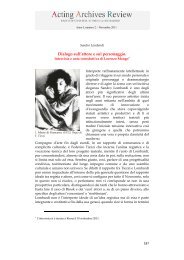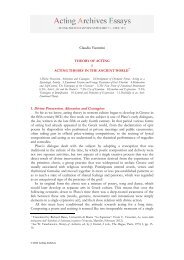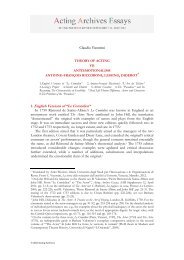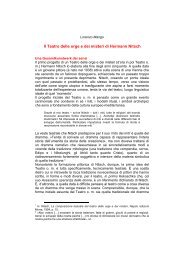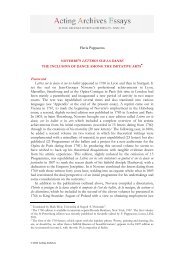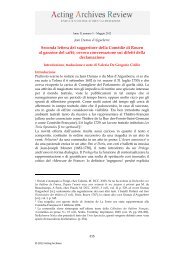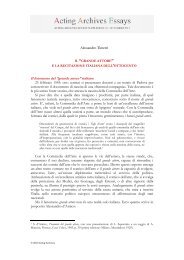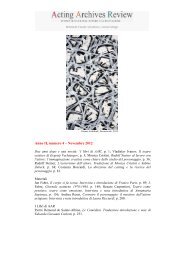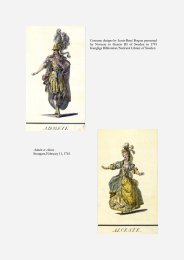Maria Ines Aliverti_The Miniatures of Jean Louis ... - Acting Archives
Maria Ines Aliverti_The Miniatures of Jean Louis ... - Acting Archives
Maria Ines Aliverti_The Miniatures of Jean Louis ... - Acting Archives
Create successful ePaper yourself
Turn your PDF publications into a flip-book with our unique Google optimized e-Paper software.
AAR <strong>Acting</strong> <strong>Archives</strong> Essays Supplement 10 – April 2011<br />
theories <strong>of</strong> this great actor, because he was the depositary <strong>of</strong> all those traditions which,<br />
in the theatre, have the force <strong>of</strong> law. And also because, irrespective <strong>of</strong> his long<br />
experience <strong>of</strong> all things concerning the stage, he had a good deal <strong>of</strong> common sense. 126<br />
This man ‘who represented both the age <strong>of</strong> <strong>Louis</strong> XIV and <strong>of</strong> <strong>Louis</strong> XV’ and who<br />
was blessed with a pr<strong>of</strong>ound knowledge in theatre matters had been <strong>of</strong> great help to<br />
Arnault in the early part <strong>of</strong> his career, when the young author had submitted to his<br />
experienced readership the tragedy <strong>of</strong> Marius à Minturnes. It is likely that Arnault drew<br />
on him for a great deal <strong>of</strong> information and details on the art <strong>of</strong> the actors belonging<br />
to the previous generation.<br />
As for the years between 1786 and 1820, a new series <strong>of</strong> recollections was<br />
planned, as these new Souvenirs were announced in the ‘Avis de l’Éditeur’:<br />
<strong>The</strong> author <strong>of</strong> these letters takes up the history <strong>of</strong> French theatre around 1760, and<br />
leads it up to 1786. <strong>The</strong> gap between that age and our own is considerable; but<br />
everything leads us to believe that it has been filled, and that the nephew has brought to<br />
completion what the uncle had left to be done. We are searching for his letters,<br />
determined to publish them as soon as we have them all in our hands. 127<br />
But this new work never appeared. 128<br />
<strong>The</strong> passage <strong>of</strong> generations is a decisive factor in the development <strong>of</strong> theatrical<br />
culture, for both actors and audiences, even more so when what we are dealing with<br />
is not texts that survive their authors and the generations that have seen their birth,<br />
but actors whose art, even when it reaches perfection, is by nature ephemeral. <strong>The</strong><br />
ephemeral character <strong>of</strong> the art <strong>of</strong> acting was felt particularly intensely by the<br />
generation <strong>of</strong> eighteenth-century actors who fought for and played a decisive role in<br />
the recognition <strong>of</strong> the artistic status <strong>of</strong> their pr<strong>of</strong>ession. Both the publication <strong>of</strong><br />
memoirs and the widespread use <strong>of</strong> portraiture, made possible by the development<br />
<strong>of</strong> cheap engravings and the success <strong>of</strong> theatrical illustrations (see the case <strong>of</strong> the<br />
publisher Bell) gave actors a means to survive in the memory <strong>of</strong> future generations.<br />
As Pierre Frantz recalled in the preface to Talma’s Réflexions sur Lekain et sur l’art<br />
théâtral, the great actor, more than any <strong>of</strong> his predecessors, with the notable exception<br />
126 ‘M de la Porte jouissait au Théâtre Français d’une certaine considération; il y avait droit, non<br />
seulement parce qu’il avait soufflé Lekain, mais encore parce qu’il avait été le confident des théories de<br />
ce grand acteur, parce qu’il était dépositaire de toutes ces traditions qui, au théâtre, ont force de loi. Et<br />
aussi parce qu’indépendamment d’une longue expérience de tout ce qui concerne la scène, il avait<br />
beaucoup de bon sens’. [A. V. Arnault], Souvenirs d’un sexagénaire, p. 156. On de La Porte see the entire<br />
passage on pp. 155-156.<br />
127 ‘L’auteur de ces lettres prend l’histoire du théâtre français vers 1760, et la conduit jusqu’en 1786. La<br />
lacune de cette dernière époque à celle où nous sommes est grande; mais tout nous porte à croire<br />
qu’elle ait été remplie, et que ce que l’oncle laissait à faire a été achevé par son neveu. Nous sommes à<br />
la recherche des lettres de celui-ci, résolus de les publier dès que nous les posséderons toutes’. ‘Avis de<br />
l’Éditeur’, in [A. V. Arnault], Les Souvenirs et les regrets (1861), pp.vi-vii. <strong>The</strong>se new memoirs, which were<br />
intended to prove the talent <strong>of</strong> contemporary actors, are also announced in the final note (ibid., p.<br />
214).<br />
128 As Barbier informs us: ‘On avait annoncé, comme devant y faire suite, les Souvenirs et Jouissances d’un<br />
jeune auteur dramatique. Cet ouvrage n’a point paru’. Antoine-Alexandre Barbier, Joseph-Marie Quérard,<br />
Paul Billard (eds.), Dictionnaire des ouvrages anonymes, IV, 553.<br />
46



